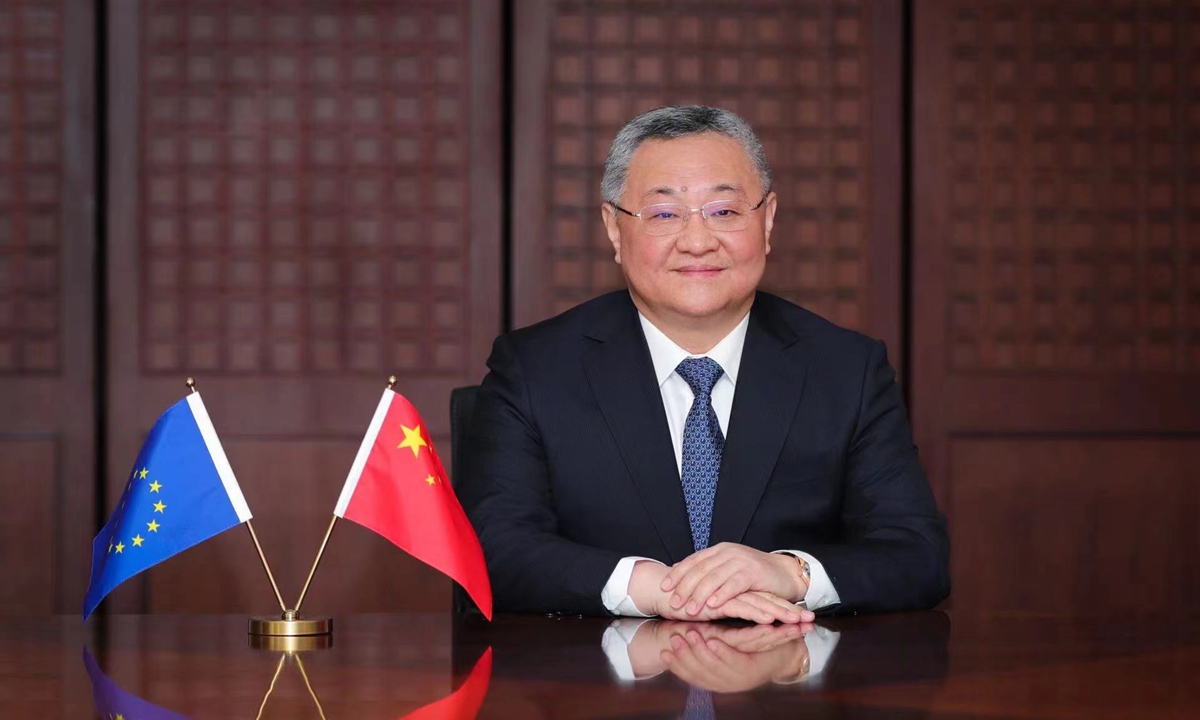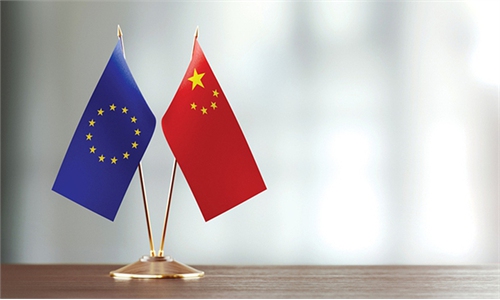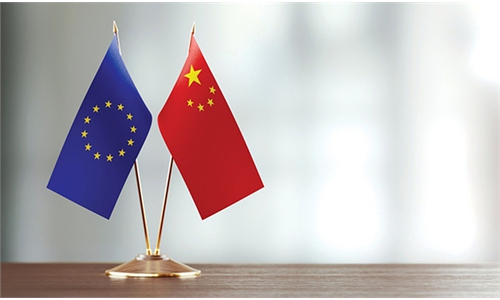Exclusive: EU would be tying up its own hands and feet if it blindly pursues ‘de-risking’: Chinese ambassador to EU

Ambassador Fu Cong, head of the Chinese Mission to the EU. Photo: Courtesy of Chinese Mission to the EU
Editor's Note:2023 marks the 20th anniversary of the establishment of the comprehensive strategic partnership between China and the EU and the 25th anniversary of the China-EU leaders' meeting mechanism. On December 7, the 24th China-EU Summit was held in Beijing, which was the first in-person China-EU summit since 2019. During the summit, Chinese President Xi Jinping stressed that China and the EU should be partners for mutually beneficial cooperation, strengthen two-way political trust, build strategic consensus, cement the bonds of shared interest, steer clear of various kinds of interference, and step up dialogue and cooperation for the good of their people. In an exclusive interview with the Global Times' reporters Chen Qingqing and Bai Yunyi (GT) following the summit, Fu Cong (Fu), head of the Chinese Mission to the EU, talked about the outcomes of the summit, the future prospects of the China-EU relations and remaining challenges in the relations.
GT: The 24th China-EU Summit was held in Beijing on December 7. What did the meeting achieve? What do you think is the greatest significance of the meeting?
Fu: This China-EU Summit coincided with the 20th anniversary of the establishment of the comprehensive strategic partnership between China and the EU, and the 25th anniversary of the China-EU leaders' meeting mechanism. During the meeting, leaders from both sides had an extensive face-to-face exchange on strategic and overarching issues concerning China-EU relations, as well as dialogues and cooperation in various fields, key concerns of both parties, global governance, and hot international and regional issues, reaching important consensus on a series of matters, which include:
First, to clearly uphold the strategic stability of China-EU relations and consolidate the political foundation. Both sides agreed to utilize the China-EU Summit and the five high-level dialogue mechanisms effectively to enhance mutual understanding and trust, manage differences appropriately, and strengthen the stability and reciprocity of China-EU relations. The EU side reiterated its adherence to the one-China policy.
Second, to firmly commit to opening-up and cooperation, strengthening dialogue and cooperation in key areas such as trade and investment, green development, digital economy, artificial intelligence, geographical indications, intellectual property, and export controls.
Third, to accelerate the resumption of personnel exchanges between China and the EU, support stronger cultural and people-to-people exchanges. Both parties agreed to hold a new session of the high-level people-to-people dialogue mechanism next year.
Fourth, to jointly address global challenges, practice multilateralism, enhance international coordination, and advance reforms in the WTO and the international financial system, jointly tackle climate change, biodiversity, food security, public health, and other global issues.
In this Summit, leaders from both sides did not shy away from differences, they engaged in in-depth communication on respective concerns with a candid and constructive attitude. China particularly expressed concerns about the EU's "de-risking" and restrictive trade and economic policies, including the EU's anti-subsidy investigation against Chinese electric vehicles and issues related to 5G, urging the EU to keep its trade and investment market open, provide a fair and non-discriminatory business environment for Chinese companies, and use trade remedy measures prudently.
This year's China-EU Summit, the first offline meeting since the COVID-19 pandemic, was highly valued by both sides and received widespread attention.
Currently, with the rapid evolution of situation with changes unseen in a century, increasing instability in international landscape, insufficient global economic momentum, and the emergence of numerous global challenges, China-EU relations face new opportunities and challenges. The face-to-face strategic communication between the leaders not only provides new political impetus and paints a blueprint for the future development of China-EU relations, but also highlights the global impact and world significance of China-EU relations, injecting more stability and certainty into a world riddled with turmoil.
We are willing to work with the EU side to implement the outcomes of this Summit, adhere to the position of partnership, mutually-beneficial cooperation, dialogue, and consultation, manage differences properly, and promote the healthy and stable development of China-EU relations.
GT: Since the end of last year, high-level exchanges between China and Europe have been frequent. How do you interpret this phenomenon? In your opinion, have China-EU relations emerged from the "low period" of the past few years, or are they still "tense and cool"?
Fu: Since the end of last year, China-EU exchanges and cooperation have been fully resumed. Rich results have been achieved in high-level dialogues in strategic, economic, trade, green, and digital fields. The high-level people-to-people exchange dialogue mechanism is about to be restarted, showing a positive trend of recovery and warming in China-EU relations.
This China-EU Summit has brought this year's high-level interactions between China and Europe to a climax. Next year, both parties will fully restore the five major high-level dialogue mechanisms in strategy, economy, trade, environment and climate, digital, and people-to-people exchanges. The financial, industrial, regional policy, competition policy dialogues, and the first meeting of the China-EU financial working group will also be held in due course. Frequent high-level interactions are not only a sign of the recovery and warming of China-EU relations but also play an important guiding and driving role in bilateral relations, indicating that strengthening China-EU exchanges and cooperation is the general trend and the aspiration of the people, and is an unstoppable historical current. It is believed that through joint efforts, both parties will be able to quickly make up for the "three lost years" due to the pandemic.
However, China-EU relations still face many difficulties and challenges that require joint efforts to overcome.
China views the EU relationship from a strategic and long-term perspective and has always regarded the EU as a comprehensive strategic partner. We also hope that the European side can establish a rational, objective, and realistic perception of China, viewing the relationship from a "partner" perspective, and discarding the mentality of viewing China as a "competitor" or a "systemic rival." Both sides should work together to promptly implement the consensus reached in this Summit, inject more positive energy into China-EU relations, and remove difficulties and disturbances for China-EU cooperation.
GT: How do you think the China-US San Francisco summit will affect China-EU relations? How do you assess the future development of China-EU relations?
Fu: The international community has paid high attention to and positively evaluated the San Francisco summit meeting between the Chinese and US head of state. This fully demonstrates that improving China-US relations not only serve the fundamental interests of the people of both countries, but also align with the common interests of countries worldwide.
China and Europe are two major independent forces in the world, sharing broad strategic consensus and common interests. The strengthening of China-EU cooperation is a strategic choice based on respective interests, not targeted at, dependent on, or constrained by a third party.
China's policy toward Europe remains stable in the long term, always viewing Europe as a comprehensive strategic partner. In the current complex and intertwined international situation, the strategic significance and global impact of China-EU relations are more prominent, concerning world peace, stability, and prosperity, and must be well maintained and developed. This is also the primary consensus of the recent China-EU Summit.
Currently, China-EU relations stand at a new starting point. Compared to China-US relations, China-EU relations have a longer history, more consensus, and fewer disagreements. As long as we adhere to mutual respect and oppose self-centrism, insist on dialogue and consultation, against confrontation and conflict, and maintain open cooperation while oppose decoupling and supply chain disruptions, China-EU relations will surely overcome various difficulties and continuously reach new heights. I am confident in the future of China-EU relations.
GT: The development of China-EU relations also faces some discord. Some voices unilaterally emphasize the competitive aspect between China and Europe, even exaggerating China and Europe as "systemic rivals" and advocating for "de-risking" and "reducing dependency" on China. Do you think the differences between China and Europe have been exaggerated by the outside world?
Fu: China and Europe, with different historical and cultural traditions and social systems, naturally have divergent views and disagreements on some issues. However, as President Xi Jinping has stated, we should not view each other as rivals just because our systems are different, reduce cooperation because competition exists, or engage in confrontation because there are disagreements.
In fact, any objective and rational observer can see that China and Europe, at different stages of development, have highly complementary economies. Cooperation between them far outweighs competition, and consensus is much greater than disagreement. Over the years, the EU has benefited tremendously from cooperating with China, powerfully advancing its own development through this cooperation. The Chinese market has become a primary source of global profits for many European businesses. We should focus on adding value and tightening the bonds of the China-Europe community of shared interests through deeper and broader cooperation. This aligns with the interests of both sides and the expectations of the international community.
GT: The recent anti-subsidy probe into Chinese electric vehicles has also sparked strong dissatisfaction in the Chinese industry. Do you think there is a substantial difference between the concept of "de-risking" and "decoupling"? Has the EU fully communicated with China at the policy implementation level?
Fu: We understand that all parties have their own concerns, but it's crucial to define and guard against risks appropriately. We oppose the geopoliticizing, ideologizing, and generalizing security concept of economic issues, which turn the concept of "de-risking" into a synonym for "decoupling and supply chain disruption."
Economic globalization has interwoven the world's economies so intricately that non-cooperation is the biggest risk, and lack of development is the greatest insecurity. Currently, China is advancing high-quality development and a high level of openness. As China's modernization progresses, countries worldwide are seizing opportunities for cooperation with China to share its development dividends. If the EU blindly pursues "de-risking" and "reducing dependency" on China, it would be akin to tying up its own hands and feet, inevitably paying the price for actions that go against economic laws.
Chinese side expressed its concerns over the EU's "de-risking" and restrictive economic and trade policies, including the EU's anti-subsidy investigation into Chinese electric vehicles, during the recent China-EU leaders' meeting. The EU side has repeatedly stated that it will not decouple from China or turn inward and will adhere to WTO rules and the principles of fair competition. We urge the EU to fulfill these commitments, maintain open trade and investment markets, and provide a fair and non-discriminatory business environment for Chinese enterprises.
GT: Recently, Lithuania claimed that China lifted its trade ban on Lithuania before the China-EU leaders' meeting. Can you confirm this news? What is your comment on this?
Fu: Ultimately, the issue was created by Lithuania's side. China consistently acts in accordance with the rules of the WTO and will address issues based on these rules.



